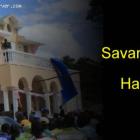ADVERTISEMENT
Haitian President - Haiti Observer Blog
Haitian President, Haiti Observer Blog. Read the following articles about Haitian President
President of Haiti - Henri Namphy
Born on November 2nd 1932 at Cap- Haitien, Henri Namphy was another military leader who became the president of Haiti. In the army he rose to the post of a general. His first stint in the political area was as the President of Haiti during a period where the interim body ruled.
Interim Council
The interim body was the National Council of Government and they ruled from February 1986 to February 1988. This interim council consisted of six civilians and six military personnel. This interim body assured elections and reforms that would be people friendly.
Herard Abraham - Haiti's army man and a political figure
Herard Abraham was born on July 28th 1940 in Port-au-Prince. At a very young age he enlisted himself into the Haitian army. He rose in the ranks of the army and also had a short stint in politics. So he can be called an army man and a political figure.
Foreign Minister
Hérard Abraham rose to the position of Lieutenant General of the Haitian Force Arme D'Haiti and became a close member of the inner circle of the Duvalier family.
In spite of being close to the Duvalier Family, Herard Abraham joined hands with the new president Henri Namphy. He served as the foreign minister in the new government, his first political post.
Role, Term of Haitian Presidents from Haiti Independence to 2013
The Haitian government is led by a president, who shares his/her executive power with the prime minister. Once elected by popular vote, the president will run the country for five years. After the term, the president could not run in the next election. He/she has to wait for five years in order to seek a second term. Haiti presidents can only serve for a maximum of two terms.
Not everyone can run for president as there are certain qualifications and requirements to be eligible for the seat. Only candidates with Haitian citizenship by birth can run for the position, as well as those who are at least 35 years of age. Jail sentence, loss of civil rights and lack of property ownership and residency can make a candidate ineligible to assume the position.
Haitian President Emile Jonassaint
Haiti's transition to democracy took a long process and a long line of political leaders before it was fully achieved. In the 1980s and 1990s, Haitians and the government had to deal with several sudden changes in leadership as one president to the next were overthrown by coup d'états, revolts, and even foreign pressure. One of these individuals who were cut short from their presidency due to ongoing political turmoil was Émile Jonassaint, who served for a mere five months from May to October 1994.
Emile Jonassaint 's former administration was considered a puppet government of the military regime that has earlier removed Jean-Bertrand Aristide from office in 1991 after he won the first free elections in Haiti. The short five months under Jonassaint's temporary rule was met with chaos and violence between Aristide supporters and the military. In 1994, the U.S. government intervened and negotiated with the Haitian president to give back Aristide's presidency. He agreed and signed the famous Port-au-Prince Accord and maybe avoided the U.S.'s invasion over the country that was being torn by politics. He died at the age of 82 a year later.
Ertha Pascal-Trouillot
Despite the changing gender roles and the growing feminist movement, female presidents or heads of state are quite rare in Haiti. One of these very few powerful women in history is former Haitian president Ertha Pascal-Trouillot. Politics has always been said to be meant for males as power and control are often associated with being a man. But as time went by, women began competing with this notion and have been made leaders and politicians along with men.
Pascal-Trouillot was born in a suburb of Haiti's capital Port-au-Prince in 1943. Her father was an iron worker while her mother was a seamstress and was the ninth child of their ten children. The future president acquired a law degree from the prestigious École de Droit des Gonaives and was a judge for federal courts for more than ten years. She then became the first woman justice of the country's Supreme Court. And in 1990, Pascal-Trouillot was proclaimed as Haiti's temporary president after the successful revolt against former president Prosper Avril which put him out of office.
Bruno Blanchet
Bruno Blanchet is a prominent Haitian who was the Acting President of the Republic of Haiti. He was nick named in French as Bruno Blanchet the Elder which means one thousand seven hundred sixty. He was experienced and important personnel of Jean-Jacques Dessalines government of Haiti.
Emperor Dessalines was assassinated while he was about to make an important reform about former landless slaves of the state. His decision made a lot of senior staff of the government angry and he was killed, as a result, in 1806 by his staffs including Alexandre Petion, Jean-Pierre Boyer, Andre Rigaud, Bruno Blanchet and some others.
Jean Pierre Boyer's Autocratic Rule
Jean Pierre Boyer, Haiti's 4th President, ruled for 25 years. He was one of several military leaders instrumental in establishing the Republic of Haiti in 1804. A high-born mulatto, he received his education in France, where he entered the French Revolutionary Army, becoming a battalion commander.
Boyer originally fought alongside Toussaint L'Ouverture towards the beginning of the Haitian Revolution, but switched allegiance to Alexander Petion when he learned the French wanted to re-introduce slavery. During Petion's rulership of Haiti, he had the Constitution amended so he could name his successor. Shortly before his death, he appointed Boyer.
Michel Domingue Reluctant Leader of Haiti
Michel Domingue, 13th President of Haiti, began life in Les Cayes in 1813. Coming from an educated background, he attended military school where he graduated. A natural military leader, he was appointed a commander over army troops in the South Department, after graduation.
The Council of Secretaries of State (CSS), the then-current ruling body, appointed Domingue President of Haiti in June of 1874. Domingue, reluctant to assume many duties of office, appointed Septimus Rameau, a high-level official of the CSS to administer public functions of ruling. Rameau and Domingue were opposites, Rameau tyrannical and oppressive, Domingue retiring and melancholic.
Domingue's greatest strength lay in foreign policy. Upon assuming office, he negotiated a peace treaty with the Dominican Republic (DR), ending a brutal border conflict of several years duration. Author of the treaty, he sent both Rameau and Chief of Staff, General N. Léger, to Santo Domingo to draw up the accord. It was successfully signed into law on January 20, 1875.
Strong Administrator Louis Borno Rejects Free Elections
Louis Borno, a lawyer by profession, assumed the Haiti presidency in 1922. Elected by the State Council, he ruled alongside U.S. Major General John H. Russell, U.S. President Harding's appointee.
Borno had served as Foreign Minister under President Theodore, refusing to cede control of Haiti's finances to the U.S. The U.S. responded by seizing the National Bank of Haiti's assets. Serving again under President Dartiguenave, Borno's skill as a negotiator persuaded the U.S. to commit to Haiti's economic growth, without receiving any land in the bargain. When Borno became president, Haiti was still debt-ridden. He brokered a loan of $23 million dollars to balance the budget and also lowered import taxes to equalize the trade deficit.
Does Wyclef Jean want to be President of Haiti?
Wyclef Jean has been the star player in Haiti for a while now, does that mean he want to be president of Haiti?
For the past decade, Wyclef Jean has been advocating for Haiti and Haitians all over the world. He has spearheaded relief efforts in Haiti, following the massive earthquake which devastated the country in January, 2010.
In 2005, Jean established the Yele Haiti Foundation which provided scholarships to 3,600 children in Gonaives, Haiti, after the devastation by Hurricane Jeanne. In its second year of operation, Yele Haiti Foundation almost doubled the amount of the scholarships and spreaded them throughout Haiti, providing tuition in 5 regions.
Our objective is to share with you news and information about Haiti and the people of Haiti. Traditions, habits and the way we were or grew are alive in this site. We highly recommend that you Subscribe to our Newsletter and also share with us some of the things that are memorable and made us unique people.

 Haitian Creole Translation
Haitian Creole Translation  The Town of Savanette, Haiti
The Town of Savanette, Haiti  Haiti tech Summit
Haiti tech Summit  Haitians are a Proud People
Haitians are a Proud People  Newsletter
Newsletter